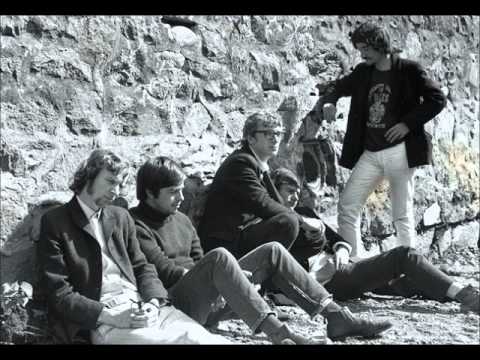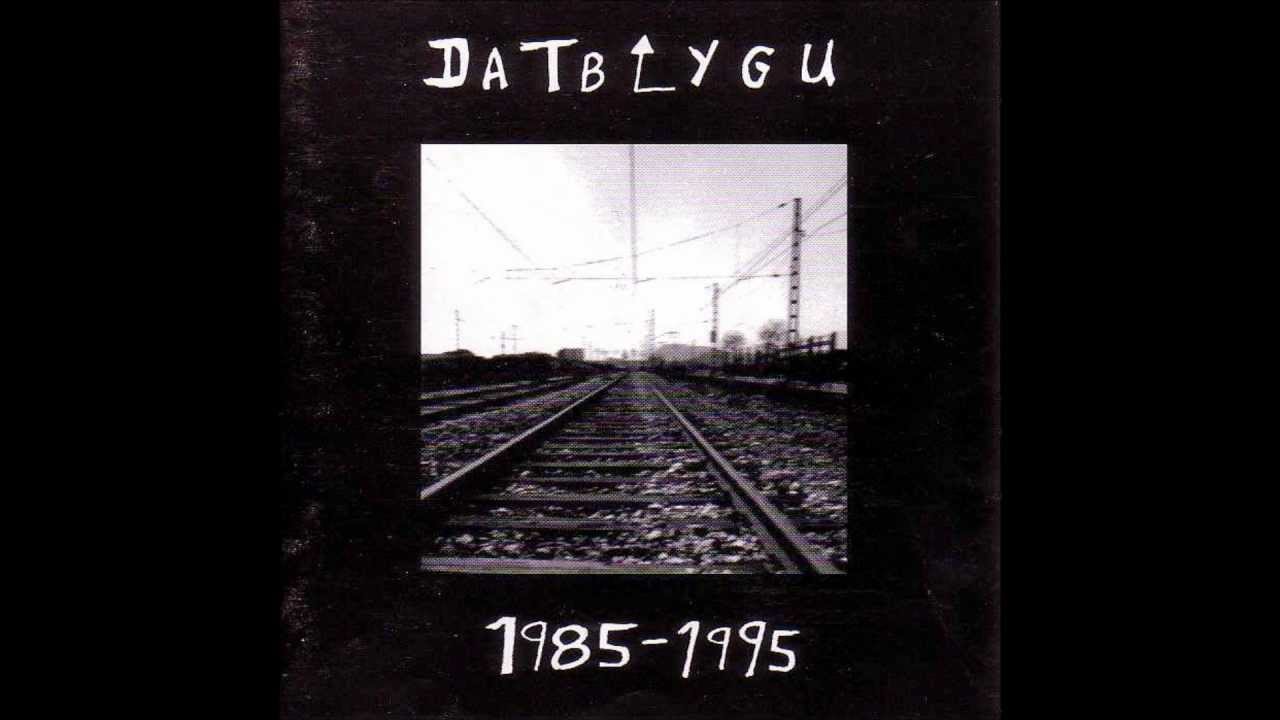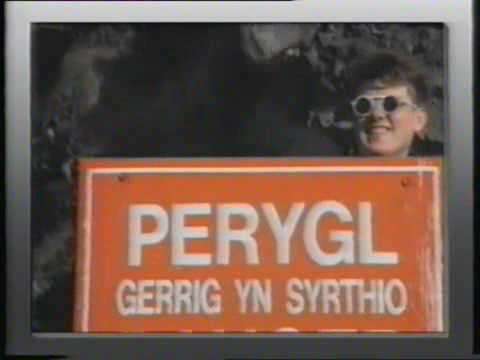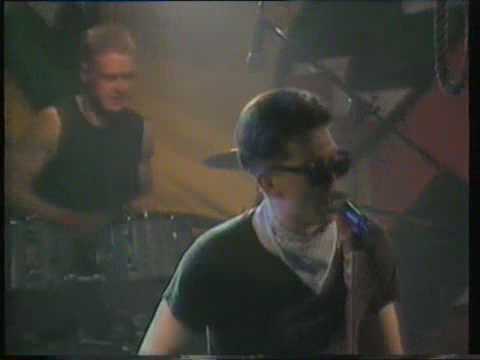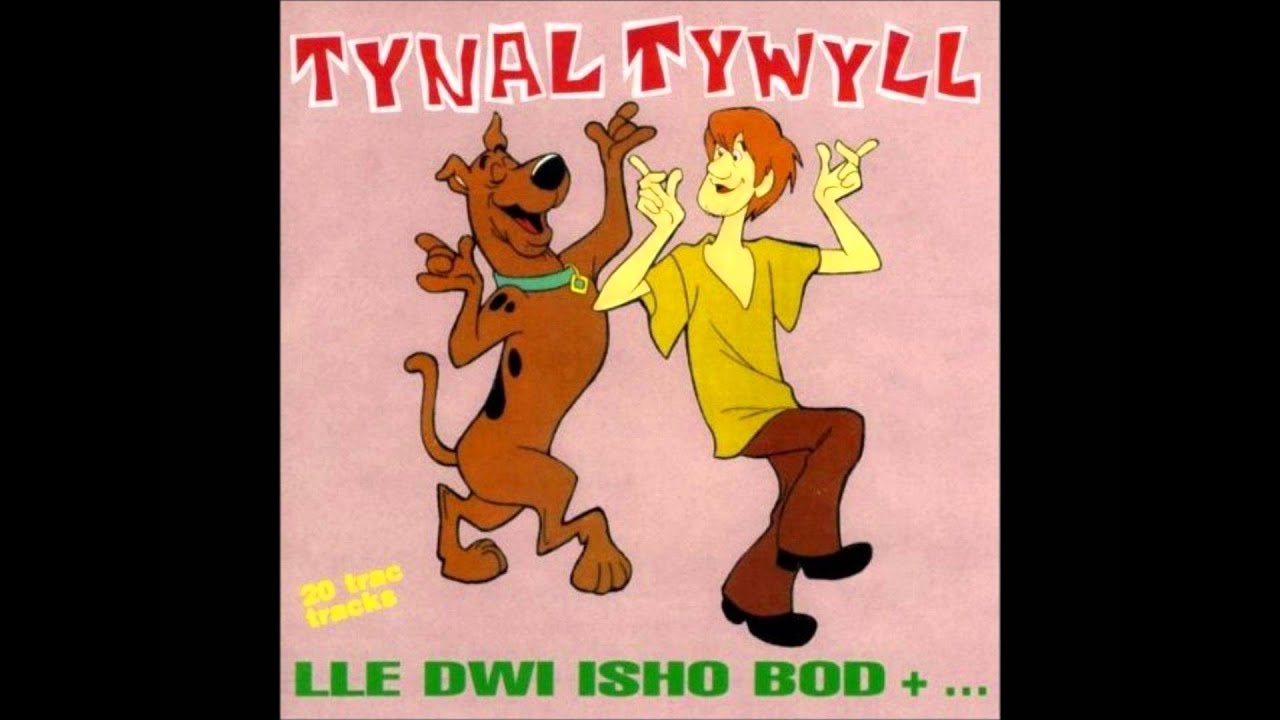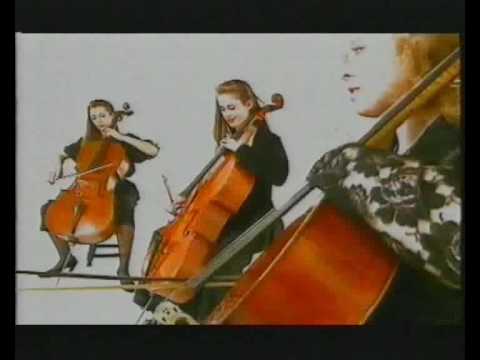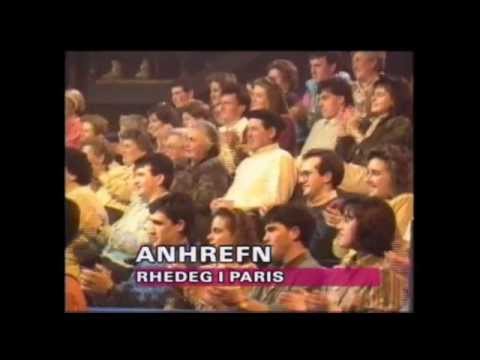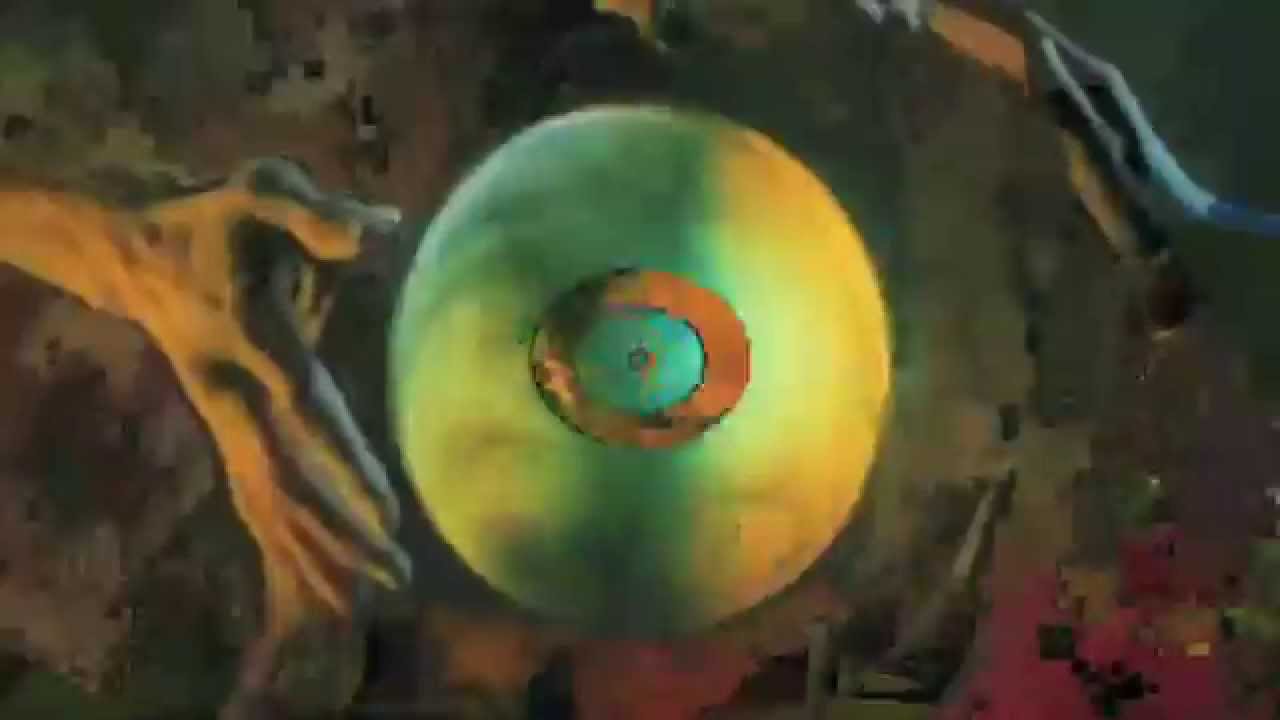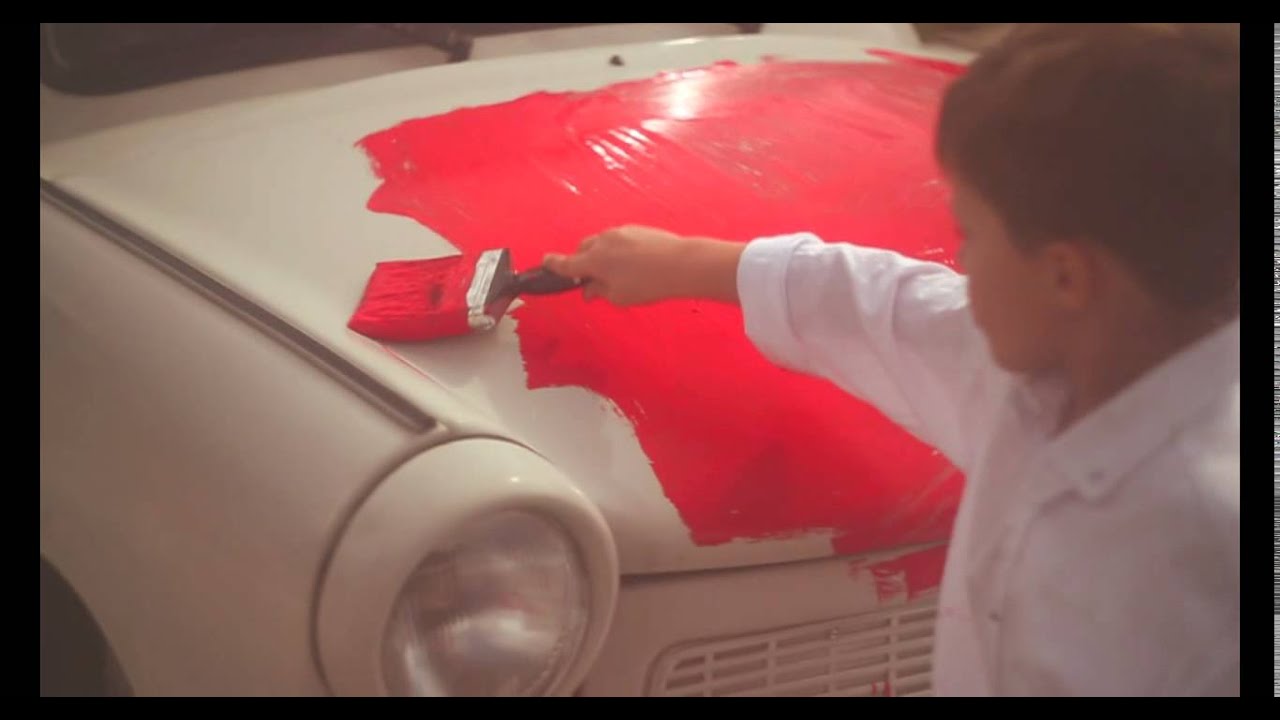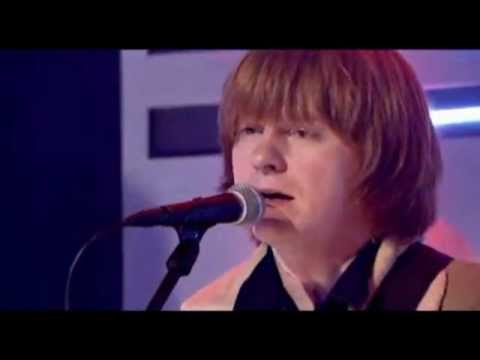Official logo of Cymdeithas yr Iaith Gymraeg, the Welsh Language Society
‘The smaller a culture you come from,’ Gwenno reflects, ‘the more you need to push things forward. That’s your only chance of survival. Otherwise you become this relic of history. I understand the lack of confidence – you want to hold onto things that you feel identify you as you and are different from everyone else – but what music and art have constantly shown within Welsh language culture is that the people who have pushed things forward are the reason why we still exist, at least why the Welsh language still exists. Cause if you don’t have a band that connects with you, or you can’t read a book or watch a film that makes you cry, if there aren’t those things that can inspire you in a language, then what’s the point of that language? The purpose of language is communication, to inspire you to think and think ahead and push your own boundaries.’
Novelist Anthony Burgess writes in his Language Made Plain: ‘The true British are the Welsh. Those Ancient Britons whom the Romans fought and subdued were driven to Wales (‘land of the foreigner’) by the invading Anglo-Saxons. English is a foreign language as far as Britain is concerned. Welsh, or Cymric, was the tongue for many centuries of what is now called England. The Welsh language…deserves our respect and our homage.’
As does its music. And 2015 is shaping up to be a good year for sounds in the Welsh tongue. Back in April, Domino re-released Super Furry Animals’ Mwng, their all-Welsh album that originally reached Number 11 in the UK Album Charts and is still the biggest selling Welsh language album of all time. And on July 24th, Heavenly Records are putting out Gwenno’s Y Dydd Olaf. Released last autumn on Cardiff independent label Peski, their initial pressing had sold out by the time Gwenno’s support slot for Gruff Rhys finished this winter. Heavenly picking up the record is a big deal. As are the spins Gwenno’s been getting on primarily English language radio, with BBC 6 Music playlisting lead-off track ‘Chwyldro’ and giving the record Album Of The Day on July 15th.
Legendary punk rocker, Recordiau Anhrefn label owner, antiquarian, and author Rhys Mywn tells me, ‘There’s a long tradition of cool bands from Wales. Take your pick but let’s say you go back to the Young Marble Giants in 1979/1980. They were absolute mavericks. Their album Colossal Youth was just as powerful as Never Mind The Bollocks. Even though it was minimalist, there was such a power and energy to it. I see Gwenno as the next milestone on that long journey of cool bands coming from Wales. She’s in that tradition of pushing boundaries. Welsh is probably the oldest language that we have in the British Isles, so it’s a bit of a non-sense that historically, apart from John Peel, there’s been such a reluctance to play stuff in Welsh. So I am really pleased that those barriers are being totally trashed by artists like Gwenno. How amazing is it that Heavenly Records are putting out a Welsh language record?!’
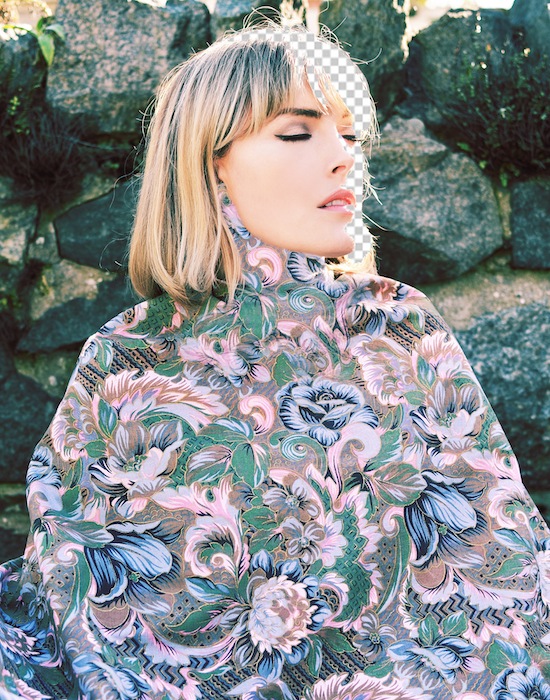
Gwenno (photo by Jacek Davis)
Heavenly Records founder Jeff Barrett recounts: ‘Obviously being mono-linguist English people we had no understanding of what Gwen was saying but the melodies, the voice, the music and Rhys Peski’s gorgeous and inventive production had us swooning. And when I met Gwen and Rhys, I met them as a fan, and I found they are two of the most lovely, creative, and interesting people imaginable. I discovered that we shared political leanings and I had a good feeling that one day perhaps we’d do something. That night I watched Gwen play live supporting Gruff Rhys at Koko in London. She was phenomenal. We asked them about Heavenly picking up the record and were overjoyed when they said yes. Sometimes you get an artist that just captures folks’ imagination that little bit more and that’s what we’ve got now with Y Dydd Olaf. Is it because Gwen’s Welsh? Is it because of the language? Yes, that’s probably got a lot do with it – it’s interesting. Did we feel we were giving a platform to something ‘outsider’? Nope, we approached it the same as we do all the time – great music, smart, cool, creative artist, good songs.’
In our Quietus interview last year, Gwenno stated ‘The Welsh language is quite a political thing even when it isn’t. What inspires me about the language is that it still exists, which makes it quite political, because the powers that be have tried to get rid of it.’ Rhys Mwyn picks up this theme, ‘What’s really healthy with Gwenno is she’s a young artist who’s not afraid of politics. That’s a breathe of fresh air. Gwenno has all the pop ingredients – she looks fantastic, the tunes are great, that song ‘Chwyldro’ I keep playing that over and over again, it’s a great pop record, and what does it mean? ‘Revolution’ (laughs) And she makes it cool. She looks cool and makes it cool.’
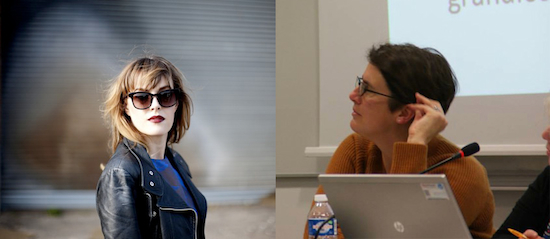
Gwenno (photo by Jacek Davis) & Dr. Sarah Hill
I caught up with Gwenno and Dr. Sarah Hill, lecturer in music at Cardiff University and author of the book ‘Blerwytirhwng?’ The Place of Welsh Pop Music, to discuss their thoughts on Welsh language music past, present, and future.
Dr. Sarah Hill: I like that people are thinking of Welsh as another world language. The thought that everybody in the world downloaded ‘Gangnam Style’ without having the first idea what the lyrics mean suggests that you can sell a song if it’s catchy no matter what the language is. Why should Welsh be any different? If the material is good, if the music is good, then why restrict yourself to the community that speaks the same language?
Gwenno: Absolutely. I was thinking that when ‘Gangham Style’ happened. Wouldn’t it be amazing for someone to have a novelty Welsh language hit? Something instant, in a really clever, subversive, KLF way. I also think it would be great if Wales became independent so we could enter the Eurovision Song Contest. There’s this self-contained idea within Welsh language culture that does create real oddities that would translate very well to a world stage. People would be like ‘woah, what’s that?’ I think Wales could definitely produce that if it was given a platform. There’d have to be a campaign. We’d be like the French, ‘you’re not allowed to sing in English’ (laughs)’
SH: There’s a sense that Welsh became accepted as a natural language because of people like Gorky’s and Super Furries using it. You hear a lot more Welsh music now just as a matter of course, which is something that I couldn’t have imagined would’ve happened 20 years ago. I think Mwng changed all of that. The thing about the Super Furries was that they had a pretty good career before in English and when they released Mwng, entirely in Welsh, it was more a case of ‘here’s a new Super Furries album, we all want to listen to it’. It was reviewed in the The Times, in The Telegraph. Broadsheets that would never have noticed a Welsh medium recording before were suddenly paying attention to this album because it was taken on its own merit, heard as a new release by an interesting band – what do they have to say this time? And there was really no concession to bilingualism or a gesture towards the recording being some sort of novelty or weird little blip on the radar. It was ‘this is how we’re expressing ourselves on this album. Come along for the ride.’ So in that sense it was really important, not because it was in Welsh but because it was a good album. Lyrically there’s some interesting stuff on there but also I think it’s significant that they covered a Datblygu song. That was really huge. It’s connecting the Super Furries, who had this mainstream Anglo-American success, back to Wales but it’s also making a pretty clear division between what was Welsh language popular music before that point and then now ‘this is what you can do’. And there’s the beautiful pictures of John Peel at Glastonbury wearing his Mwng t-shirt, one of the last photos before he died. It was a huge moment.
Talk about music with any hip Welsh person and it’s not long before Datblygu’s name (translating as ‘Develop’) comes up.
SH: Datblygu are the touchstone. They were a product of their time and place. Significantly the person who wrote the music was a woman (Patricia Morgan), which is almost unheard of (laughs) in a lot of ways, and the guy who wrote the lyrics (Dave Edwards) was writing them from a particular kind of personal space. He was living on the periphery and looking in on traditional Welsh culture with a pretty serious level of criticism that didn’t exist in Welsh music before then. They became this spokesband for a time in Thatcherite Britain, expressing generational and cultural grievances that weren’t getting aired.
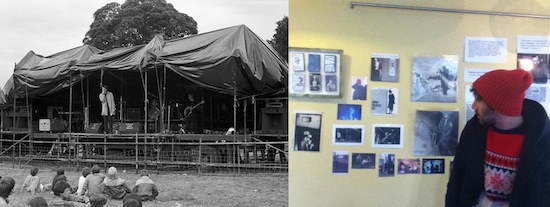
(left) Datblygu at Pesda Roc 13/7/85 with a young Gruff Rhys in the audience (photo by Medwyn Jones)/(right)Gruff looking at photo at a Datblygu exhibit he stumbled upon by accident (photo by Victoria Morgan)
SH: There’s a famous picture of Datblygu playing at a festival. The stage is really low, it’s the middle of the afternoon, and you can see Dave spitting into the microphone, and there’s like six people sitting in front of the stage. But one of them turns out to be Gruff Rhys. There was recently an exhibit celebrating the 30th anniversary of Datblygu and there’s this picture on the wall in this café. Pat Morgan’s sister Victoria posted a photo of Gruff Rhys looking at this picture and saying ‘that’s me!’ (laughs) He can remember the gig obviously but it shows that at the time, Datblygu had so little support behind them in Wales apart from the people who were keyed into it. Datblygu are an important band to mention. Because they were just playing whatever the hell they wanted. And it didn’t matter that they weren’t getting played on Welsh radio, they were getting played on the John Peel show. That aesthetic is still pretty strong now. Even if it’s not as biting and cutting as Datblygu was, the climate is still musically more adventurous than it used to be.
G: What’s exciting about a band like Datblygu is that they continue to be relevant. They’re releasing an album at the end of this year. This critique and criticism of the Welsh establishment is very hard hitting and there’s something quite dangerous about it in the context of such a small culture. It makes it more exciting. Especially with the Welsh language it’s all about ‘Welsh exists and this is brilliant and we’ve got to just celebrate that’. And someone turning round as a teenager and saying ‘actually, this is really shit, it’s not good enough, it’s really boring’ and all of these things that no one would dare say was really exciting and unique. They’ve got this fantastic song called ‘Cân I Gymry’ which means ‘Song For Wales’, which is actually a singing competition as well, and it’s just a criticism of going to work in the BBC from 1 until 3, having harp lessons for the teenage daughter, going to the Eisdteddfod, and all things that are real traditional, very respectful ways of being a Welsh person. And Datblygu shatters all of that. It hits you when you’re feeling frustrated because within a smaller culture it can become very claustrophobic and frustrating, perhaps moreso than within a majority culture. There’s something very brave about Datblygu that has continued to resonate and I think part of the reason why they’ve been so influential is because of what they represent as much as how they sound. And again, sonically, they’ve not dated. There’s something about the simplicity of the way Pat Morgan has created the music and how Dave is so concise in his lyrics that transcends generations.
Although all whom I spoke to agree that the current state of Welsh language music is very positive, with a good deal of diversity and exciting alternatives, they also continued this tradition of healthy criticism. Rhys Mwyn states ‘The Welsh language and what we’re doing has to be outward-facing, out towards the world, internationalist. I have no interest at all in the Welsh language bands that just look inwards, who just want to do stuff in Wales for whoever, that doesn’t interest me. That’s something past its sell-by date.’ Gwenno adds, “There’s quite a good infrastructure for guitar bands in Wales, but it creates monotony. Not every boy or girl at school wants to be in a guitar band. Maybe they want to do something weird, maybe they wanna do something with electronics, and they should be supported too.’ Ani Glass, whose r’n’b/dub/pop hybrid ‘Ffôl’ is Track Of The Week on Radio Cymru this week, muses ‘What a lot of Welsh music is missing is fun. You take your art seriously but you can’t take yourself seriously. And that’s quite lacking in Welsh pop culture.’
So while boys with guitars continue to get the most coverage, what other women are doing something interesting?
G: Ann Matthews has done some brilliant things over the years. She was in Fflaps and Ectogram. She’s interesting because she broke all the rules about being a perfect singer. She sang…it’s not even off key, there’s something really pretty about it, it’s just unconventional. Obviously you’ve also got Cate Le Bon, another rule breaker with the way that she carries herself musically, doing what’s unexpected vocally. It’s not what Wales is used to producing. And then I’m really excited about Angharad from <a href=
http://www.trwbador.co.uk/" target="out">Trwbador. They’ve split up now and Angharad’s doing stuff on her own. I think that’ll be fantastic cause she’s a real adventuress musically and vocally.
SH: There’s Kizzy Crawford as well. She represents a completely different side of Wales that doesn’t usually get the main stage. She’s a mixed race (Bajan-Welsh) Welsh speaker from a non-Welsh speaking area (Merthyr Tydfil). She’s very independently minded. The things she does are very self-reflective in a sense that isn’t gonna turn off all the boys but it’s also very true to who she is. She’s an incredibly mature persona in a lot of ways although she’s only 18. I saw her play in Cardiff a couple months ago, it was amazing. Because she looks different to most people in Wales, I think she gets trodded out as a sign that Wales is more multi-cultural than perhaps it is (laughs).
G: That’s the thing, Cardiff is incredibly multi-cultural. I remember growing up in Riverside in Cardiff and going to a Welsh school and everyone being white. And I was like ‘this isn’t Cardiff! This is a weird little bubble!’ So you can see why Welsh media are completely embracing someone like Kizzy. I hope it opens things up a bit more. Cultural diversity is so important. Particularly within the Welsh language. I think the more cultures that come into it, the more exciting Welsh becomes. You’re getting all these different perspectives, and there’s a real potential there musically as well.
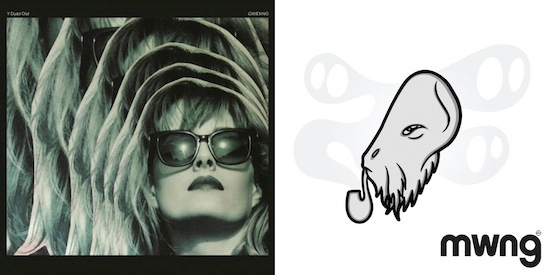
Gwenno’s Y Dydd Olaf/Super Furry Animals’ Mwng
Aside from the artists, there’s a tradition of interesting indie labels who have played an important role in getting this music out there. Peski Records’ Rhys Edwards, who himself makes lo-fi folktronica under the name Jakokoyak, gives a brief history: ‘When we were growing up, Ankst was the label of our dreams and the biggest influence on us. We loved their internationalist ethos and their fierce objection to the imposed ‘mainstream’ and institutional Welsh language culture. Recordiau Anhrefn (run by the legendary Rhys Mwyn) is another monumental label which existed before them and had a far-reaching cultural impact. They released the first compilation of alternative Welsh music, Cam o’r Tywyllwch (‘A Step Away From Darkness’), 30 years ago. Casetiau Neon (Neon Cassettes) is another label who quietly released some of the most important music we have in the Welsh language – from Malcolm Neon and Datblygu to Pysgod Melyn ar Draws (trans. ‘Yellow Fish Going Across’) and Meibion Mwnt (‘Sons of Mound’, ‘Mwnt’ is also a place name).
Another outstanding label was Recordiau Safon Uchel/High Quality Recordings (active during the Naughties). A quasi-imaginary label that turned the idea of a label into an art-piece in itself. It was the brainchild of the sound artist and idea machine, Geraint Ffrancon. He created his own media (the Trosi fanzine), released loads of music from a wide-variety of artists (turns out he was all of the artists), and abruptly stopped when he reached the 50th release. The spectrum of sounds and styles he managed to achieve with all his musical aliases was a real feat.
There’s a community of truly independent labels in Wales working together with little or no support at all available to them. Shape Records is one of Wales’ finest labels with their thoughtful releases and striking artwork. Serein is another wonderful label (also located in rural mid-Wales) that are busy churning out beautiful experimental music. Peski have been lucky enough to release some of Wales’s best alternative artists over the past decade, from Cate Le Bon and R. Seiliog to Texas Radio Band, Y Pencadlys, and more recently Gwenno. The challenge we’re facing now is knowing what role to play as an independent record label, given that artists are able to self-release and promote online. Whatever it is, I still believe that a label should fundamentally be about operating as a musical lighthouse and an essential curator of music, and I see us as vital contributors to the cultural landscape here in Wales.’
Ankst Records is certainly a label worth getting acquainted with, having brought us Gorky’s Zygotic Munci and releases by Ffa Coffi Pawb and Y Cyrff, the predecessors of Super Furry Animals and Catatonia respectively. Their 40 track Radio Crymi Playlist Vol. 1 Ankst 1988-1998 is a good starting point. The label’s ethos is also in line with what we’ve been discussing. Founding partner Emyr Glyn Williams: ‘By the mid-eighties the 1960’s protest/music scene had turned into a lumpen folk heavy beast that said very little to the emerging generation of Welsh youngsters and had settled into a stifling period of happy isolation and a general antipathy to the non-Welsh world. As far as we could see, this new rough and experimental music scene was the only creatively alive part of the Welsh language culture and the only part of it that was actually open to us. And of course it was really exciting to us as teenagers. These new bands seemed to be looking out of Wales and didn’t sound like the Welsh music of the past. Since the 60’s the Welsh language music scene had been completely linked to the political fight for the future of the language – and initially it was the same with Ankst. Political links were strong between the label and the wider Welsh language alternative culture. But this political link was undone for us in the early nineties when we signed a new generation of bilingual musicians to the label who were attacked within Wales as being in some way traitors in their use of both languages in their music. Obviously the right of the artist to be free to create according to his or her own choices was a more important principle than releasing ‘pure’ Welsh language material only.’
This freedom is an important point, and should be viewed in the context of the world stage as well. Singing in Welsh is important to these musicians for a big reason – being their mother tongue, it’s only natural. Rhys Mwyn: ‘For me, it was always about ‘why would I want to sing in English, if Welsh is my language?” Ani Glass shares similar feelings, ‘It’s not that I don’t want to sing in English, or think I shouldn’t. I’ve realised that I want to sing in Welsh. I live in Wales and I’m first language Welsh so it makes sense.’ Colorama’s Carwyn Ellis considers his bilingual output as ‘It’s a reflection of my day-to-day existence. I speak English most of the time and I speak Welsh some of the time. So I sing most of my songs in English and I sing some in Welsh.’
For Gwenno it’s a matter of documentation. ‘I like this idea of creating Welsh albums as small documents of a time, just so that they exist. I find this idea really exciting. It’s a little shout going ‘I’m here!’ Which sounds a little overromantic but it’s very practical too. I don’t want to look back in 20 years time and think ‘what Welsh albums came out that year? I could’ve at least tried to make one and I didn’t bother’. So it’s up to you. It’s that responsibility of if you want something done you’ve got to do it yourself.’
Recommended Listening
Classics:
Y Blew (‘The Hair’) – Beth sy’n dod rhyngom ni (‘What Comes Between Us’) Rhys Mwyn: ‘The first Welsh language rock record was by a band called Y Blew in 1967. It sounds like the Spencer Davis Group and shows that this is not something recent. In 1967 we were producing good records.’
Datblygu – Y Teimlad (‘The Feeling) – Later covered by Super Furry Animals on Mwng, this is an anomaly for Datblygu, being their most straight-up love song. Rhys Mwyn: ‘I was in the studio with them when they recorded that. It was a seminal moment. You knew, that’s a hit.’ Dr. Sarah Hill: ‘It’s naïve in some ways, really ponderous in other ways, and very deep in a lot of ways. It also speaks as poetry, not just as a recording.’
Pop Negatif Wastad (‘Pop Negative Forever’, with further connotations of a photographic negative) – Iawn (‘Right’) A male/female duo consisting of Gareth David Potter of the industrial/post-punk Traddodiad Ofnus (‘Tradition Of Fear’) and Esyllt Anwyl Lord of 16 year old punk rockers Crisialau Plastic (Plastic Crystals). Potter: ‘We had both just read the KLF book ‘The Manual’ and were aiming to do just that, create great quality pop music but in Welsh and with no money (laughs). We got Gorwel Owen (SFA/Gorki’s producer) to produce and went for this arch Pet Shop Boys electro/acid house that really appealed to both of us at the time.’ They only made the one record, but what a record it is. Also of interest is their Welsh language cover of Big Black’s ‘Kerosene’.
Y Cyrff (‘The Bodies’) – Cymru, Lloegr A Llanrwst (‘Wales, England, and Llanrwst’) An anthem if you’ve ever heard one. Mark Roberts (vocals, guitar) and Paul Jones (bass) went on to form Catatonia.
Tynal Tywyll (‘Dark Tunnel’) – Jack Kerouac – As Sarah Records legend Harvey Williams says ‘this is blinding jangle pop’, reminiscent of a Welsh Smiths. Rhys Mwyn: ‘Their guitarist, Nathan Hall, is a genius. They just looked so cool. I signed them to my record label on looks alone, I’d never actually heard them. I saw them at a Y Cyrff concert and just thought ‘who the hell are they?”
Ffa Coffi Pawb – Sega Segur (‘Idle Sega’) – Pre-Super Furries band with Gruff Rhys and Dafydd Ieuan, as well as Rhodri Puw who later joined Gorky’s. The name literally translates as ‘Everybody’s Coffee Beans’ but speaking it phonetically gets ‘Fuck Off Everyone’. Their Am Byth (‘Forever’) collection has some great tunes and here they are getting their glam on.
Anhrefn (‘Disorder’) – Rhedeg I Paris (‘Running To Paris’) Rhys Mwyn’s punk rock band (1982-1995). Their best known song and a kick ass one at that.
Current:
Gwenno – Chwyldro (‘Revolution’) – One of the most badass pop songs released in recent years. A killer groove with a spaced-out swagger and chorus of ‘don’t forget your heart is in the revolution’.
Ani Glass – Ffôl (‘Foolish’) ‘There’s no Welsh pop music I can relate to,’ explains Glass, ‘and a lack of Welsh pop music in general, so I realised that in order to hear what I like, I’d have to create my own. ‘Ffôl’ deals with people’s general tendency to complain about things without actually doing anything about them, so this is me doing something about it.’
Y Pencadlys (‘The Headquarters’) – Poeni Am Billy (‘Worried For Billy’) ‘He has a big sense of drama and humour’ says Ani Glass, Y Pencadlys being the exception to her statement that the Welsh music scene lacks fun. He is using more guitars here than his usual electronica and it’s recommended to catch him live to get the full effect of what he has to offer.
Colorama – Mari Lwyd (‘Grey Mare’ but also a strange ancient custom in honour of mid-winter) An atypical uptempo psychedelic rocker rounding off their recent collection of Welsh language songs, Dere Mewn. Bandleader Carwyn Ellis was responsible for the ear-catching production on Sarah Cracknell (Saint Etienne)’s latest solo effort, Red Kite, with Ellis also co-writing half the album.
Gwenno’s Y Dydd Olaf is out now on Heavenly Recordings. Super Furry Animals’ Mwng and its deluxe edition are available through Domino.


